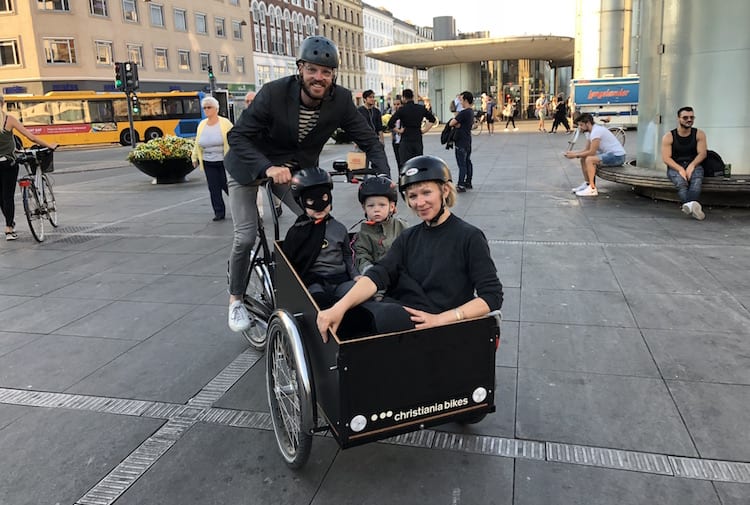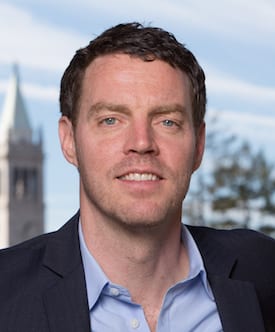
How do Nordic countries dominate virtually all global sustainability metrics? Why are Nordic companies three times more likely to be in the Dow Jones Sustainability Index than U.S. companies? How did the brewer Carlsberg leverage open innovation to develop the green fiber bottle? And how did IKEA become a global leader in supply chain social responsibility?
Berkeley Executive MBA (EMBA) Class of 2018 students will explore the answers to these questions and more during a new international Immersion Week called “Sustainable Business in the Nordics.” The August 20-24 trip is organized and led by Lecturer Robert Strand, director of the Haas Center for Responsible Business (CRB) and an expert in sustainability and Nordic business—defined as business in Denmark, Sweden, Norway, Iceland, and Finland.
“Simply put, the Nordics are global leaders in sustainable business,” says Strand, who will accompany 70 EMBA students to Denmark during a week of sessions and site visits. “There’s no better place on the planet to go to learn first-hand about the most progressive approaches to sustainability and sustainable capitalism. The world is in need of inspiration, and the Nordics provide it.”
This new international immersion to the Nordics is one of five experiential learning weeks that comprise a quarter of the EMBA curriculum.
Strand, who came to Haas in 2014, has close ties to the Nordics. Arriving in Norway as a U.S. Fulbright Scholar in 2005, he returned to the Copenhagen Business School in Denmark in 2009 to earn a PhD and continued thereafter as an assistant professor before coming to Haas. He maintains a formal affiliation with the Copenhagen Business School as an associate professor.

Over the past decade, Strand has led hundreds of American business school students and professors on immersion study tours traveling across the Nordics with the University of Minnesota, the U.S. Department of Education’s CIBER (Center for International Business Education and Research) program, and the Copenhagen Business School. The new EMBA immersion schedule is the culmination of these years of Strand’s experiences and connections.
The Nordic approach to business appeals to Strand for its flat organizational structure and democratic practices, emphasis on greater gender equality, and embrace of social purpose. “There’s a deep-seated commitment to consensus-building, a participatory leadership style, humility, and humanism in Nordic business,” says Strand, who grew up in Wisconsin and earned an MBA in international business at the University of Minnesota. “Life in the Nordics—and business as a component of it—is fundamentally seen as a cooperative endeavor, not competitive. It’s about co-creating value together.”
Strand’s research backs this assessment. Prof. Ed Freeman of the University of Virginia’s Darden School of Business, with Strand, coined the expression “Scandinavian Cooperative Advantage,” to describe the Nordic firms’ ability to cooperate with stakeholders.
Copenhagen-based healthcare company Novo Nordisk, the world’s largest producer of insulin, described by Forbes in 2012 as “the most sustainable company on Earth,” is an example of what the Scandinavians get right, Strand says. “Their goal is to not only treat, but to eradicate, diabetes,” he says. “And by all measures they are one of the greatest sustainability leaders.”
During the immersion, students will meet with Mads Øvlisen, former CEO and chairman of Novo Nordisk and former chairman of Lego. On a separate day, the group will visit Novo Nordisk for sessions with Susanne Stormer, vice president of corporate sustainability, and company CEO Lars Fruergaard Jørgensen.
The week kicks off with a visit to Annette Stube, head of group sustainability for shipping giant Maersk at the company’s Copenhagen offices, followed by lunch with Claus Meyer, father of the new Nordic cuisine movement and co-founder of the original Noma restaurant.
Other highlights include:
- A welcome reception at the Copenhagen Business School, with a keynote by Ambassador Ove Ullerup, Danish ambassador to Sweden.
- A visit to beer-maker Carlsberg, where they’ll hear from Simon Hoffmeyer Boas, the company’s director of group sustainability.

Carlberg’s fiber beer bottle prototype. Photo: Carlsberg At Carlsberg, the conversation will focus on the beer maker’s new green fiber bottle design—and sustainable open innovation. (Strand and Haas Lecturer Henry Chesbrough, director of the Garwood Center for Corporate Innovation, are working on a case together about Carlsberg’s open innovation approach to sustainability.) The EMBA group will end the day with a private tasting at the old brewery.
- A session with Marianne Barner, who is retired from IKEA and was a creator of the IWAY program, which governs how Ikea purchases materials, products, and services, and is the protagonist of one of the most well-known cases on social responsibility.
- A discussion with Claus Stig Pedersen, head of corporate sustainability at the sustainability leader Novozymes, and Novozymes COO Thomas Videbæk.
Strand’s long-term strategy is to continue building a bridge between Berkeley and the Nordics, a history that began at the very inception of UC Berkeley with its co-founder, the Norwegian Peder Sather—whom Sather Gate and Sather Tower are named for.
The cultural connections between UC Berkeley and the Nordics are clear, says Strand, who is currently writing the book, Sustainable Vikings: Understanding Nordic Global Leadership in Sustainable Business.
“This program represents the precise reason I wanted to come to Berkeley,” he says. “I was drawn to UC Berkeley and Haas because of our unique culture—a culture I recognize as remarkably ‘Nordic’—and believe that if there’s anywhere in the U.S. that can mainstream the progressive sustainability approaches found across the Nordics it’s here at Berkeley.”